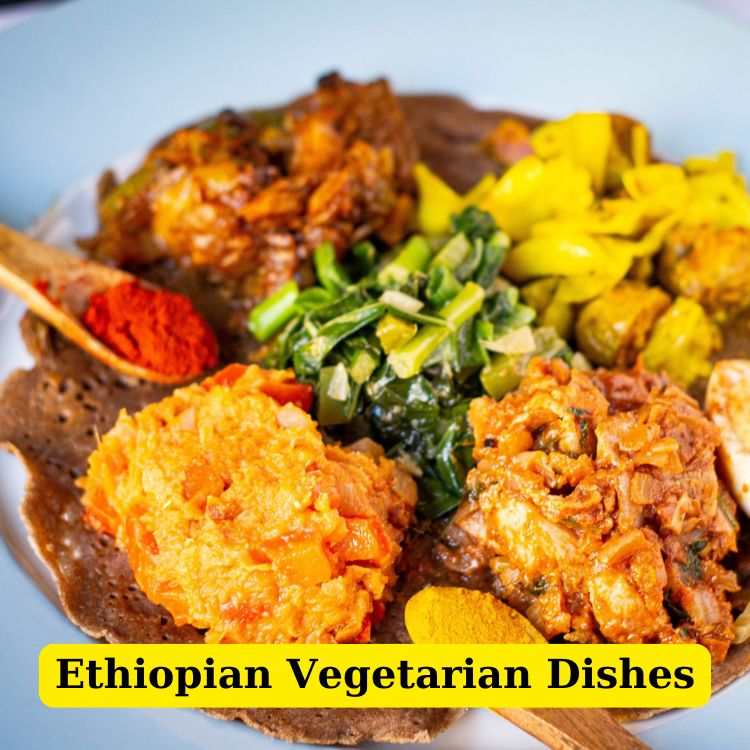Ethiopian cuisine is a vibrant tapestry of flavors, spices, and textures, with vegetarian dishes playing a central role. Rooted in centuries-old traditions and the cultural significance of fasting days in Ethiopian Orthodox Christianity, these dishes offer incredible variety and depth. This guide explores some of the most iconic vegetarian meals, their cultural significance, and how you can enjoy them.

What Makes Ethiopian Vegetarian Dishes Unique?
Ethiopian vegetarian cuisine is characterized by its heavy reliance on legumes, vegetables, and robust spice blends like berbere and mitmita. Dishes are traditionally served on injera, a tangy, spongy flatbread made from fermented teff flour, which doubles as a utensil. Ethiopian meals are communal, encouraging shared experiences.
Popular Ethiopian Vegetarian Dishes
1. Shiro Wat (Chickpea Flour Stew)
A creamy and flavorful stew made from chickpea flour, red onions, garlic, and berbere spice. This dish is often a staple during fasting periods and pairs perfectly with injera.
2. Misir Wat (Spicy Lentil Stew)
This hearty dish features red lentils simmered with berbere, onions, and niter kibbeh (spiced clarified butter, or its vegan alternative). It’s both comforting and rich in protein.
3. Tikil Gomen (Cabbage and Potatoes)
A mild yet flavorful medley of cabbage, carrots, and potatoes seasoned with turmeric and garlic. It’s a simple yet essential side dish in Ethiopian meals.
4. Gomen (Collard Greens)
Collard greens sautéed with garlic, onions, and spices. It’s a staple for its nutritional value and versatility, often served alongside stews.
5. Azifa (Lentil Salad)
A cold lentil salad mixed with mustard, lemon juice, and herbs. Light and refreshing, it’s a popular dish during the hot season.
6. Fasolia (Green Bean and Carrot Stir-Fry)
A simple yet flavorful dish made with green beans, carrots, and tomatoes, spiced with mild Ethiopian flavors.
7. Duba Wat (Spicy Pumpkin Stew)
This lesser-known gem combines pumpkin with the bold flavors of berbere, creating a warming and spicy dish.
Health Benefits of Ethiopian Vegetarian Cuisine
- Rich in Plant-Based Proteins: Lentils, chickpeas, and beans are staples.
- Packed with Nutrients: Vegetables like collard greens and carrots are nutrient-dense.
- Heart-Healthy Spices: Spices such as turmeric, ginger, and garlic have anti-inflammatory properties.
- Gluten-Free Options: Teff-based injera and many dishes cater to gluten-free diets.
How to Enjoy Ethiopian Vegetarian Dishes at Home
- Stock Essential Ingredients: Berbere spice blend, teff flour, chickpea flour, lentils, and fresh vegetables.
- Make Injera: While traditional injera requires fermentation, quick recipes using alternative flours are available.
- Experiment with Spices: Ethiopian cuisine is defined by its bold flavors, so don’t shy away from spice blends like berbere and niter kibbeh (or its vegan counterpart).
Cultural Significance
Ethiopian vegetarian dishes are deeply tied to religious fasting, during which animal products are avoided. These fasting days, observed by Ethiopian Orthodox Christians, have fostered a rich tradition of plant-based cooking.
FAQs About Ethiopian Vegetarian Dishes
Q: Are all Ethiopian vegetarian dishes vegan?
A: Most are vegan, especially during fasting periods, as they exclude animal products like butter or dairy. However, some recipes use niter kibbeh, which can be substituted with vegan butter.
Q: Is injera gluten-free?
A: Traditional injera made from 100% teff flour is gluten-free. However, some versions mix teff with wheat flour, so it’s best to check or prepare your own.
Q: Can I find Ethiopian spices easily?
A: Berbere and other Ethiopian spices are available online or in specialty grocery stores. They can also be homemade for authenticity.
Q: What beverages pair well with Ethiopian vegetarian meals?
A: Traditional Ethiopian drinks like tej (honey wine) or coffee brewed in a jebena complement the flavors perfectly.
Conclusion
Ethiopian vegetarian dishes are a celebration of bold flavors, wholesome ingredients, and cultural heritage. Whether you’re exploring classics like Shiro Wat or trying something unique like Duba Wat, the cuisine offers something for everyone. Ready to embark on this flavorful journey? Gather some injera and dive in!

Related Articles :